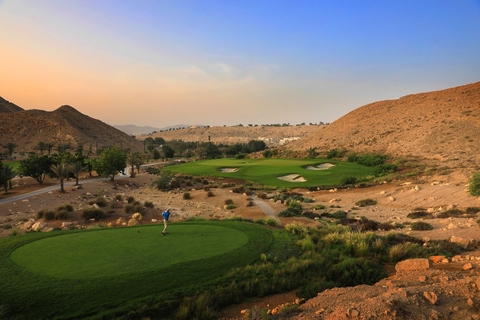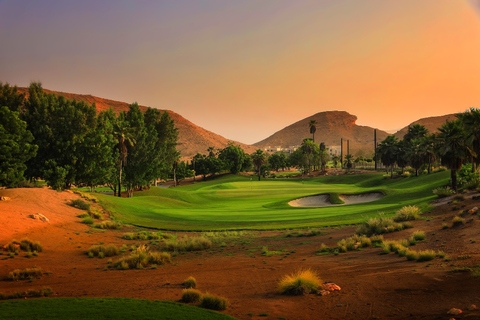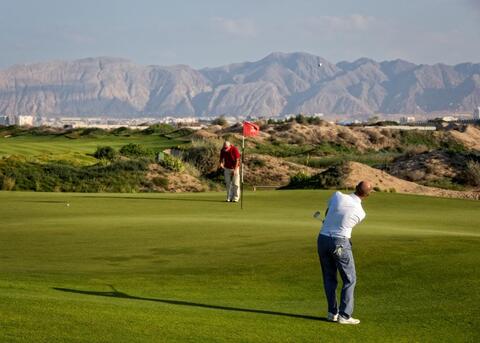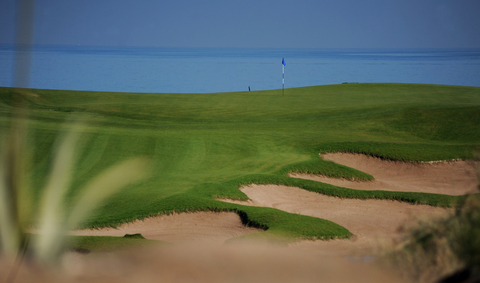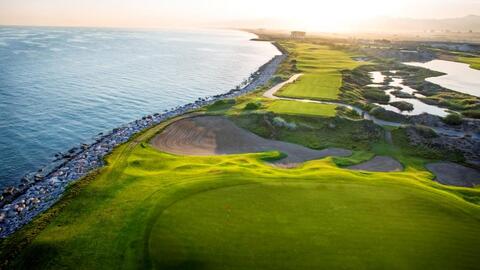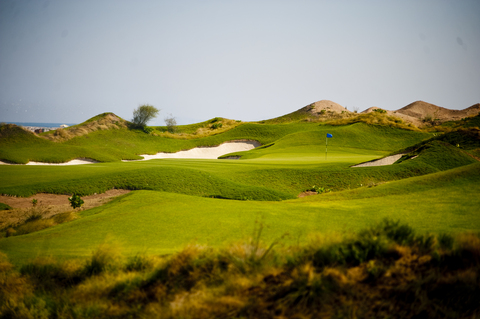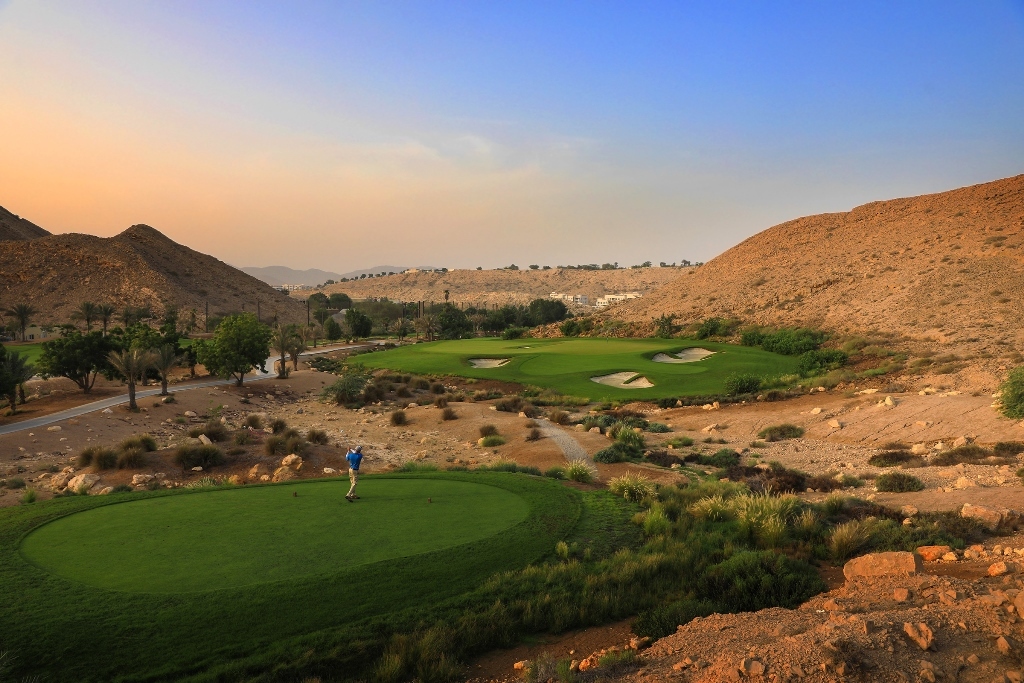
Oman for golf and culture trip
Golf Travel - Oman
0 EUR
INFO ABOUT OMAN
Capital: Muscat
Languages: Arabic is the official language in Oman however English is widely written and spoken.
Religion: Islam
Time Zone: GMT + 4
Electricity: 220 - 250 V, 50 Hz, British type plug
Climate: The best travel time is between October and May, when the weather is delightfully warm (25 – 30 degrees Celsius) during the day and pleasantly cool (12 – 19 degrees Celsius) at night.
Currency: The local currency is called Omani Rial (OMR) and there are 1000 Baizas (Bz) to 1 OMR. For daily exchange rates visit www.xe.com/ucc/. Pegged exchange rate is: 1 OMR = USD 2.58 (1 USD = OMR 0.387).
Banks: Banks open from Sunday to Thursday between 8.00 – 14.00 h. Omani Rials can be bought at all major airports. There are ATMs throughout Omani cities. Credit cards are readily accepted. Foreign traveler cheques may be changed at bigger international hotels only; this can be time consuming. It is therefore advisable to arrive with cash, credit cards and traveler checks in US Dollars.
Government Offices: Opening times are 7.00 – 14.30 h from Sunday – Thursday
Weekend/ Holidays: The official weekend falls on Thursday and Friday, with Friday being the day of prayer. Public holidays are calculated as per the moon calendar.
Ramadan: In Ramadan it is not allowed to eat, drink or smoke in public and advisable to refrain from swimming and sunbathing in wadis and on public beaches.
Dress Code: Oman is a Muslim country thus it is important to observe a certain dress code. In public places, women should wear garments that cover their upper arms and legs. They should not appear in public dressed in shorts, tight trousers, bare-backed or low-cut dresses. Men should wear long trousers and shirts. Shorts and sun tops should only be worn at the beach or by the pool. When visiting the Sultan Qaboos Grand Mosque please ensure that you do not wear any sheer fabrics, transparent or tight clothes or white trousers. All trousers have to be long and sleeves should reach to the wrists. Women are required to wear a head scarf and cover their décolleté. When swimming in public places such as beaches and wadis, please wear T-shirt and shorts; this applies for women and men. We recommend that you wear loose comfortable clothing as it will be warm. Comfortable foot-wear for walking is advisable; so is a sun hat.
Photographs: While taking photographs, it is polite to ask the person in question if it is alright to do so. While children usually oblige happily, women may refuse especially if the photographer is male. Best months for photography are November – April inthe early, mid-morning or late afternoon. Use a UV and polarizing filter. Keep in mind that it is forbidden to photograph airports, military facilities and borders.
Smoking: Smoking is prohibited in all closed public places such as shopping malls, hotel lobbies, restaurants, most bars and public transport.
Alcohol: Alcohol is not part of the Islamic culture and thus only served in licensed restaurants and hotels. Please do not drink alcohol in public or outside of licensed establishments. During the Holy Month of Ramadan alcohol is served at licensed hotels to in-house guests only and is available through room service 24 hours. It is strictly forbidden at all times to drive under the influence. You will be punished with 48 hours in prison.
Public Transport: Taxis are easily recognized by their white-orange color and the taxi sign on the roof. Negotiate the price before you enter the car as there are no taximeters. Identify your destination by prominent places nearby as street names are hardly used in Oman. In the capital Muscat taxi drivers speak reasonable English. In the interior this is mostly not the case. There are small cars which are widely used bytourists and minivans that pick up and drop off passengers at multiple locations along the way. Fares are cheaper with the latter option.
Single Lady Travelers: Oman is one of the few Arabic countries where women can travel with almost no interference as long as a certain code of conduct is respected (see i.e. Dress Code). In single taxis sit always on the back row; in collection taxis sit next to the driver. Bear in mind that Arabic women would never travel without male escort. If asked why you are alone a suitable answer could be that you visit family in the country or that you are on an important business trip. Wearing a wedding ring and carrying family photos helps, even if you don’t have a family.
Drinking Water: While it is okay to drink tab water it is more advisable to buy bottled water which is cheap (0.5 l = 200 Bz).
Food: There is a large culinary variety in Oman. In the capital area any kind of cuisine is available in all price levels. In the interior mostly Arabic and Indian food is served. It is cheap and tasty. Couples, families and women should sit in the family section.
Tips: Tipping is customary for porters, guides, drivers and restaurant staff. Passport and ID: In case of loss of passport or other official certificates please contact your embassy. We advise to carry a copy of your passport when leaving the hotel and to store the original document in a safe place.
Accident: In case of an accident, you must call the police. Without a police report, insurances will not pay for the damage.
EMERGENCY
Police, Ambulance, Fire Brigade 9999
KIMS Health Hospital, Emergency (+968) 2476 0123
Muscat Private Hospital (+968) 2459 2600
Perfect Journeys (+968) 7247 0002
GENERAL INFORMATION
Oman measures 309.500 km2 and has more than 1,700 km of coast that stretches along the Arabian Gulf and the Indian Ocean. The Hajjar mountain range crosses the terrain from Musandam in the North to the Sharqiyah region in the East. The highest peak is Jebel Shams with 3,009 m above sea level. The Sultanate is subdivided into eleven governorates and five regions. Landscape, history and tradition vary from region to region.
USEFUL INFORMATION
Many camps don’t have electricity. We recommend carrying a torch and spare batteries for your camera and other electronic devices.
Check-in time at hotels is 14.00 hrs. the check-out time is 12:00 noon. This might vary on occasions.
Omanis are hospitable people who invite foreigners for local coffee (kahwa) and dates. Always use your right hand to accept or offer food and beverages. The left is considered unclean.
In the local souk negotiations are customary. It is a game, so don’t take it in a negative way. The main aim is to agree on the fairest deal not the lowest price. Most traders speak reasonable English.
Men should not stare at, talk to, touch or take photographs of Omani women.
Showing affection in public is unwelcome.
SELF-DRIVE IN OMAN
Until 1970 Oman had only 6 km of tarmac road: the road between Old Muscat and Muttrah. Over the last 40 years a modern infrastructure with highways connecting the capital with the main interior cities was developed.
Right hand driving prevails and general speed limits are as follows: 50 km/h in cities and villages, 80 km/h on most country roads and 120 km/h on highways.
Sign boards are usually in English and Arabic. You find numerous fuel stations along the tarmac roads all over the country. Fuel is cheap: 1 liter Super costs as little as 240 Baiza (approx. 65 Pence). All stations are serviced, self-service is uncommon.
The use of seat belts is mandatory and driving under the influence of alcohol or drugs is strictly forbidden and punished with 48 hours prison. Radar controls are frequent and fines are high.
In case of an accident you must call the police. Without a police report the insurance will not pay for the damage.
Please watch out for camels and goats that freely walk on countryside roads. It can happen any time that you find yourself in front of a herd of animals. Switch on your hazard warning lights to inform the cars behind you and reduce speed.
Something that takes getting used to are the roundabouts. Cars in the roundabout have the right of way on any lane. Pay attention to other drivers as many do not indicate when they want to leave the roundabout.
Otherwise driving in Oman is easy. Compared to other Arabic and Asian countries the Omani population drives exemplary.
Exploring the beauty of Oman is easiest in a 4x4. Some areas can only be reached with a SUV. A lot of tracks lead through wadis. Be careful during sudden rain. The wadis fill up quickly and dangerous flash floods can be life threatening. Thus never camp in a wadi.
When crossing a wadi check that current is not too strong and water is not too deep. Inexperienced off-road drivers should bear in mind that cars easily get stuck in gravel. Look for the red/white poles that indicate water height and danger levels. When the water reaches the red area, avoid crossing and wait until floods have reduced to a non-dangerous level.
If you choose to drive off-road, check your fuel, oil and cooling water on regular basis. Carry enough food and drinking water with you.
When entering the desert you should always be in the company of another car and have desert driving experience. Bedouin guides can be hired to help with crossings.
DRIVING A 4WD
Without a doubt, off-road driving is exciting and fun. But not everyone is experienced in it. That doesn’t mean that one has to abstain from this adventure. The most important rule is to be careful and plan ahead.
Our recommendations:
Ensure that you have a working cell phone with full batteries. Some areas might not have connections however usually one can catch the net on a nearby hill and call for help.
Never drive alone into remote areas like the desert. A minimum of two cars is highly advisable with at least one experienced off-road driver. All desert camps offer an escort service, bookable and payable in advance.
Always carry enough drinking water with you, a minimum of 3 liters per person per day.
Check tyres before and during your journey for pressure and appearance. This also applies to the spare tyre. Driving in sand requires reduction of tyre pressure from 35 bar to 18 bar. Your guide will advise you accordingly during the car handover.
GEARS
4WD High Range: This is the most frequently used gear when driving off-road. The engine rating is transmitted onto all four wheels.
4WD Low Range: Use this gear when driving in difficult terrain or when your car got stuck. It allows controlled driving. Engine speed is higher and advance slower.
Diff-Lock (Differential Lock): This function is used when starting up under difficult circumstances or when the car is stuck in sand, gravel or water; or when all four wheels are in midair. The differential lock transfers the driving torque from a spinning wheel to a wheel with better road adhesion and improves traction.
DRIVING WITH GPS
The GPS points mentioned in the logbook are formatted as follows: h ddd°mm.mmmm'. Please ensure that your GPS device is configured in the same format.
Please do not follow the navigation commands blindly. The maps are not comparable to European maps. You may be asked to turn off-road where there are no roads. In mountainous regions and in the desert, navigation using GPS coordinates may not work due to poor reception. In this case, please use a map and follow the signs to find your way. There are always several ways of getting from point A to point B, which is why the kilometres travelled may vary from those given in this travel guide. If you need further assistance, please call your next hotel or our Perfect Journeys office. We'll be happy to help.
ACCIDENT
In the event of an accident, call the police immediately. Please do this for any accident, regardless of the type of damage. Without a police report the insurance will not pay for the damage.
ENTRANCE FEES AND OPENING HOURS (indicative + 5% VAT)
Fortresses and castles in Oman: 5 OMR (Saturday to Thursday 9:00 am - 4:00 pm / Friday 8:00 am - 11:00 am)
National Museum: 5 OMR (Saturday to Thursday 10:00 am - 5:00 pm / Friday 2:00 pm - 6:00 pm)
Oman Across Ages Museum: 5 OMR (Saturday to Thursday 9:00 am - 5:00 pm)
Bait al Safah: 3 OMR (Sunday to Thursday 9:00 am - 5:00 pm)
Bait Al Zubair: 3 OMR (Saturday to Thursday 9:30 am - 6:00 pm)
Muscat Gate Museum: free access (Sunday to Thursday 8:00 am - 2:00 pm)
Royal Opera House: 3 OMR for adults, 1 OMR for children (Saturday to Thursday 8:30 am - 5:30 pm)
PROGRAMME
Itinerary Summary
Day Date Activity Hotel Room/Board
Day 1 Tue, 27 Dec 25 Arrival at Muscat Airport → Primeclass Arrival Services The Chedi Muscat Deluxe Room, BB
Day 2 Wed, 28 Dec 25 1 Round of Golf at Al Mouj Golf Club
Optional: Muscat City Tour (afternoon) The Chedi Muscat Deluxe Room, BB
Day 3 Thu, 29 Dec 25 1 Round of Golf at Ghala Golf Club The Chedi Muscat Deluxe Room, BB
Day 4 Fri, 30 Dec 25 07:00 – Pick-up from hotel → Nizwa Cattle Market, Nizwa Fort (visit), Jabreen Castle, Birkat al Mouz → Lunch (local restaurant or picnic box) Alila Jabal Al Akhdar Ridge View Room, HB
Approx. 7 hrs with sightseeing and stops
Day 5 Sat, 31 Dec 25 08:30 – Pick-up from hotel → Al Hamra, Bait Al Safah Museum (if open), Misfat Al Abreeyn, stop at three villages of Jabal Akhdar → Lunch (local restaurant or picnic box) Alila Jabal Al Akhdar Ridge View Room, HB
Approx. 7 hrs with sightseeing and stops
